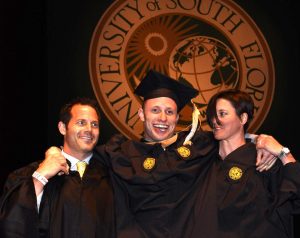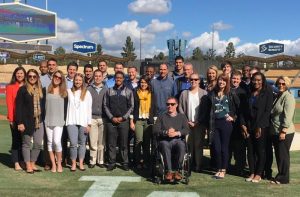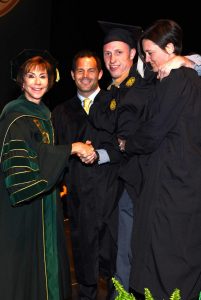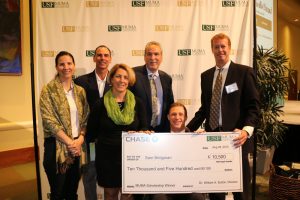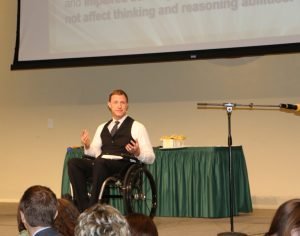Wheelchair-bound Man with FA Walks Across USF Graduation Stage, Inspiring All
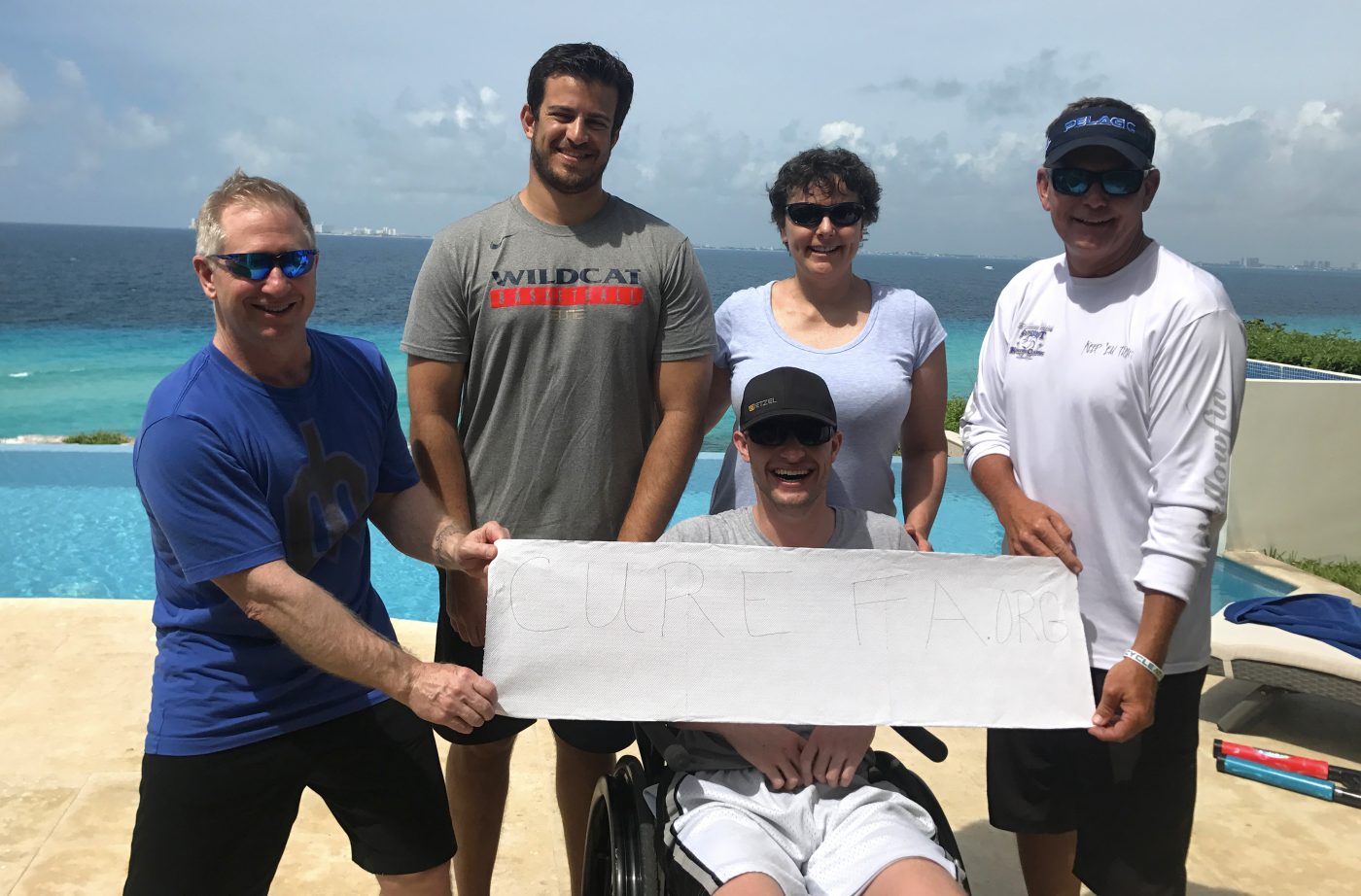
As a kid growing up in Seattle, Sam Bridgman lived and dreamed sports. An avid Seahawks fan, he loved football, baseball, hockey, soccer, skiing and boxing. In fact, world heavyweight champion Muhammad Ali was his idol, and “Impossible is Nothing” his mantra.
But in 2006, Bridgman learned he had Friedreich’s ataxia (FA) — a debilitating, degenerative neuromuscular disorder — turning his world and that of his family’s upside down. And just as FA, which affects only some 5,000 people in the United States, isn’t exactly a household name, Sam Bridgman might not have near-celebrity status at the University of South Florida if not for his sheer determination and guts.
On May 6, the young man made local headlines in Tampa and the evening TV news when he climbed out of his wheelchair and — with the help of his two trainers, Cat Wade and Bradford Scott — walked across the stage at USF to accept his master’s degree in sports and entertainment management. That earned wild applause from the audience.
“I walked across the stage as an undergrad four years ago, at the University of Portland [in Oregon], and I wanted to walk across the stage again with the same people who walked me in 2013, and come full circle,” he said. “I’m always striving for greatness and looking for that next challenge — and for me, that was the next challenge.”
Bridgman, who turns 26 on Tuesday, spoke to Friedreich’s Ataxia News from the Mexican resort of Isla Mujeres, where he’s enjoying a well-deserved vacation after years of nonstop studying and working. Our interview coincided with Friedreich’s Ataxia Awareness Day — May 20 — which is being marked this year by a photo contest of people holding up signs reading “#CureFA.”
“We’re really proud of Sam,” said his mother, Amy Koepnick. “When you get a diagnosis like this, you can choose to sit back and wallow, or life live. He’s choosing to live life, and we’re all along for the ride.”
Koepnick said that initially, it was emotionally very difficult to tell friends and relatives what was happening to her son.
“Sometimes it’s hard for people to understand the disease, so we tell them it’s similar to ALS [amyotrophic lateral sclerosis, or Lou Gehrig’s disease] in that he’ll eventually lose all function, but that the cause is different,” she said. “Now it’s been almost 11 years, and that part has gotten easier. We’ve all learned to live by his example, which is enjoy today and live every day the best you can.”
FA attacks the peripheral nervous system, beginning in the fingertips and toes, and gradually traveling toward the central nervous system. In Bridgman’s case, the 13-year-old double black diamond skier couldn’t ski at all two years later, and by the age of 18, the one-time baseball champion could no longer play baseball.
“When I was growing up, just like any other kid, I loved sports and wanted to be a professional athlete,” said Bridgman, whose FA causes his speech to be slightly slurred. “But when I got diagnosed with FA at the age of 15, I realized I’d never be an athlete, so I thought the next best thing was to work in sports.”
Following his dreams, Bridgman earned his undergrad degree in finance from Oregon’s University of Portland, about a three-hour drive south of Seattle. After graduation, he worked in accounting at the Portland headquarters of athletic footwear manufacturer Nike.
But in August 2015, he decided to move across the country and get an MBA in sports and entertainment management — a decision that was hard on the rest of his family, including his younger brother, Max.
“When Max was 19 and Sam was 22, Max moved down to Portland and lived there for two years and was Sam’s caregiver,” Koepnick told us. “And when Sam decided to go to Florida, mommy wasn’t very happy. But he’s proven us wrong, and shown us that he can do it.”
Because his mother grew up in nearby Clearwater, Florida, Bridgman isn’t completely alone; he has many aunts, uncles and cousins in the Tampa-St. Petersburg area, which is also a sort of hub for the FA community.
Also living in Tampa is Paul Avery, the longtime president of Outback Steakhouse restaurant chain and now CEO of World of Beer. The father of two girls with FA, Avery is chairman of the board of the Friedreich’s Ataxia Research Alliance (FARA), a nonprofit organization based in Downingtown, Pennsylvania, that advocates on behalf of FA patients and raises funds to research possible cures for the currently incurable disease.
According to FARA’s website, FA, a very rare genetic disorder, affects only one in 50,000 Americans. Most experience their first systems between the ages of 5 and 18; adult or late-onset FA is far less common.
Mutations or DNA changes in the FXN gene cause FA, which is inherited in an autosomal recessive manner, meaning that individuals with FA have two mutated or abnormal copies of the FXN gene. For that to happen, both biological parents must be a carrier of the disease. It is estimated that one in 100 people are carriers of this mutation.
“Because it’s so rare, it’s pretty cool to be able to talk with someone who knows what your day-to-day life is like, and to be able to mentor a kid with FA,” Bridgman said. “When I was first diagnosed, I had people I looked up to who had FA.”
As a student, Bridgman found that technology — ranging from exercise machines to smartphones — has eased his difficulties tremendously.
“The people at USF really helped me work through everything,” he said. “Technology is great. I record most of my classes and then I don’t have to take notes as much. A lot of times I use my iPhone and use voice texting. And typing on a keyboard depends on my energy level. Some days, I just need to rest, but like anyone, you need to eat well, sleep well and exercise.”
To that end, every week Bridgman tries to ride his handcycle — a type of tricycle powered by the arms rather than the legs. He also spends 30 minutes a week on an AlterG anti-gravity treadmill, and does weight resistance training on a regular basis.
Bridgman now works full-time as business development coordinator for the Tampa Bay Lightning, a professional hockey team. He also helps out FARA whenever he can.
“With the support of friends and family, I was able to keep going and live life,” Bridgman said. “It took me awhile to accept FA, but I don’t think I would have been able to without their help.”




